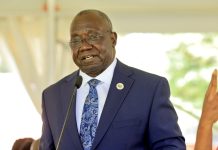Uganda Airlines, long under scrutiny for its steep financial losses, still retains significant potential for investment if key strategic changes are implemented, according to a new report from Parliament.
The Public Accounts Committee on Commissions, Statutory Authorities and State Enterprises (PAC-COSASE) noted that although the carrier posted a net loss of Shs237.9 billion in the 2023/2024 financial year, its revenues grew by more than 50 percent compared to the previous year.
Passenger revenue climbed by 58 percent, cargo by 55 percent, and excess baggage by 63 percent.
“These statistics show a clear demand for Uganda Airlines’ services. What is missing is the operational efficiency and targeted investment to convert these figures into profits,” said Hon. Medard Lubega Sseggona, chairperson of COSASE.
He presented the findings drawn from the 2023/2024 Auditor General’s report on the airline during the plenary sitting on Thursday, 11 September 2025, chaired by Speaker Anita Among.
Since its revival, the government has injected Shs1.87 trillion into Uganda Airlines. While cumulative losses stand at Shs1.02 trillion, the committee emphasised that, under prudent management, the airline could evolve into a profitable national asset.
PAC highlighted Uganda Airlines’ strategic advantage as the country’s flagship carrier, linking Uganda directly to important destinations across Africa and beyond.
The launch of new routes including Johannesburg, Riyadh, and Accra though delayed by budgetary constraints, was singled out as an important area for investment.
“The aviation industry is extremely competitive but equally lucrative when handled strategically. If Uganda Airlines builds alliances with established global carriers, boosts its marketing efforts, and adopts modern fleet management through leasing, it can transform into East Africa’s premier hub airline,” the report stated.
COSASE also underscored the growing potential of the airline’s cargo arm, particularly given Uganda’s expanding exports in fresh produce, fish, and manufactured goods. Cargo income rose by more than half in 2024 despite a limited fleet and logistical bottlenecks.
To draw both public and private investors, PAC pressed for tighter financial oversight. It pointed to gaps such as awarding General Sales Agent (GSA) contracts without bank guarantees and accumulating Shs11.9 billion in contingent liabilities from lawsuits and lost-baggage claims.
“These vulnerabilities weaken investor trust,” the committee observed. “Uganda Airlines must strengthen accountability in its contracting and staff conduct to establish a reliable platform for growth.”
Although challenges persist, the committee concluded that Uganda Airlines remains a viable entity. It urged the positioning of Entebbe International Airport as a regional hub and called for greater investment in digital ticketing and customer service platforms.
PAC further recommended that the airline urgently reassess its business model, prioritising aircraft leasing over outright purchases and pursuing code-sharing agreements with established carriers.
The committee also advised the government to consider targeted funding directly aimed at profitable routes and cargo services.























